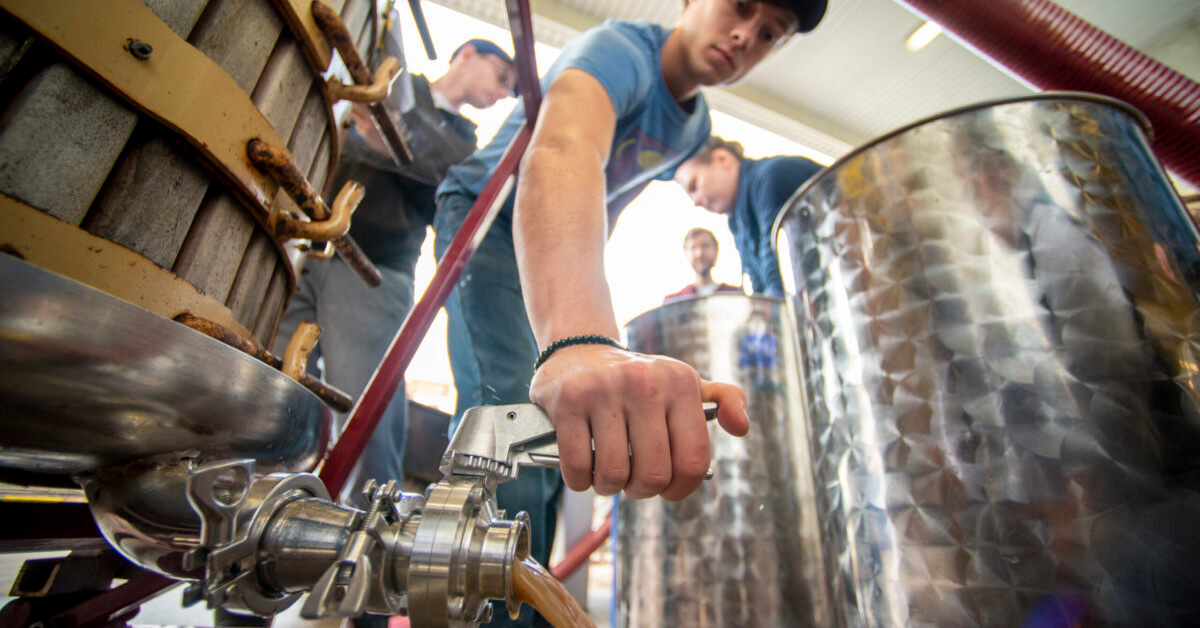Wineries, breweries, and distilleries are a unique, innovative, and growing part of Canada’s agriculture and agri-food sector. According to the Government of Canada, the wine sector alone generated $1.2 billion in revenue in 2016 and employed 5,600 people! Since then, the federal government has invested in further developing the agri-food industry through the Canadian Agricultural Partnership, a $3-billion fund committed to charting the course for government investments over the next five years.
As leaders in agricultural training and innovation, and sustainable environmental practices in agri-food, it’s no surprise that colleges and institutes have stepped up to the plate – or the glass – in the beverage industry as well. In fact, these institutions are home to many state-of-the-art, industry-leading facilities and have been among the first to provide training to meet winery, brewery, and distillery demand. For example:
- The Brewmaster & Brewery Operations Management program at Olds College introduces students to the art and science of brewing, including technical beer-making skills, research into developing new recipes, sourcing of locally grown materials, and entrepreneurship skills necessary to manage and operate a craft brewery. As a leader in agricultural innovation, Olds also conducts research for new crops such as quinoa, hemp, and hops.
- The Canadian Food and Wine Institute at Niagara College is home to a Teaching Winery, Teaching Brewery, and a Teaching Distillery fed by the institute’s 40-acre vineyard, hop yard, fruit-tree orchard, and culinary garden. Program offerings include Winery and Viticulture Technician, and Wine Business Management, Brewmaster and Brewery Operations Management, and Canada’s first Artisan Distilling program and provide students with an in-depth understanding of the scientific, technological and business aspects of the industries. The institute also, last week, hosted its first Food & Beverage Innovation Summit.
- The two-year Brewing and Brewery Operations program at Kwantlen Polytechnic University (KPU) is the only brewing diploma of its kinds in British Columbia and combines a solid foundation in brewing science with hands-on practical learning at KPU’s pilot brewery. Students explore the history of brewing, brewery equipment and technology, packaging and sales, as well as brewing chemistry and recipe formulations.
- Known as a leader in culinary studies, Vancouver Community College also offers a part-time Wine Sommelier program in partnership with the Wine & Spirits Education Trust (WSET) after which graduates are fully WSET certified.
- The Centre for Craft Brewing Innovation at Durham College offers access to expertise state-of-the-art facilities, and research services supporting craft brewers while giving students valuable experience by working on research projects to refine brewing methods and recipes.
- Collège La Cité’s Sommelier program also recently added a course specific to beer, spirits, and non-alcoholic beverages such as mineral water pairings.
- In 2016, Cégep de Jonquière inaugurated the very first micro-brewery program in Quebec (Techniaues de production en microbrasserie) and, last year, officially opened its own artisanal brewery to expand training with hands-on learning. The program trains students in beer production and quality control, brewing science and ingredient chemistry, and equipment sterilization and maintenance.
- Cégep de Saint-Félicien is also set to launch its first program in fine alcohol distillation with the goal of expanding Quebec’s distilling industry. The attestations d’études collégiales Local Product Development (specialization fins alcohols, schnapps, mistelles) will train students to produce high quality beverages, both alcoholic and non-alcoholic, distilled from local boreal fruits and vegetables.
- Nova Scotia Community College’s (NSCC) one-year Cool Climate Wine and Viticulture certificate explores the wine industry in Atlantic Canada from the essentials of growing grapes to the science of wine making and the business of tourism, sales and marketing. Courses include biology for viticulture, vineyard and harvest health, pest management, and aging and bottling.
- Okanagan College is known for its food, wine, and tourism programming, including a Wine Sales Certificate and a Viticulture Technician Diploma. The college was also recently awarded British Columbia’s second Technology Access Centre (TAC), the BC Beverage Technology Centre that will provide business services and applied research assistance to the wine, beer, cider, and spirits industries throughout the province.
As innovation in agriculture continues to expand to meet the challenges posed by climate change and sustainable growth, so will Canada’s beverage industry, spurred by colleges and institutes that live at the nexus of hospitality, tourism, gastronomy, agriculture, and innovation.

